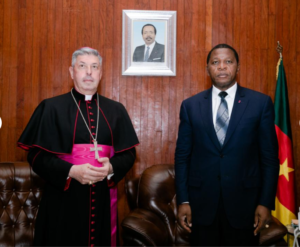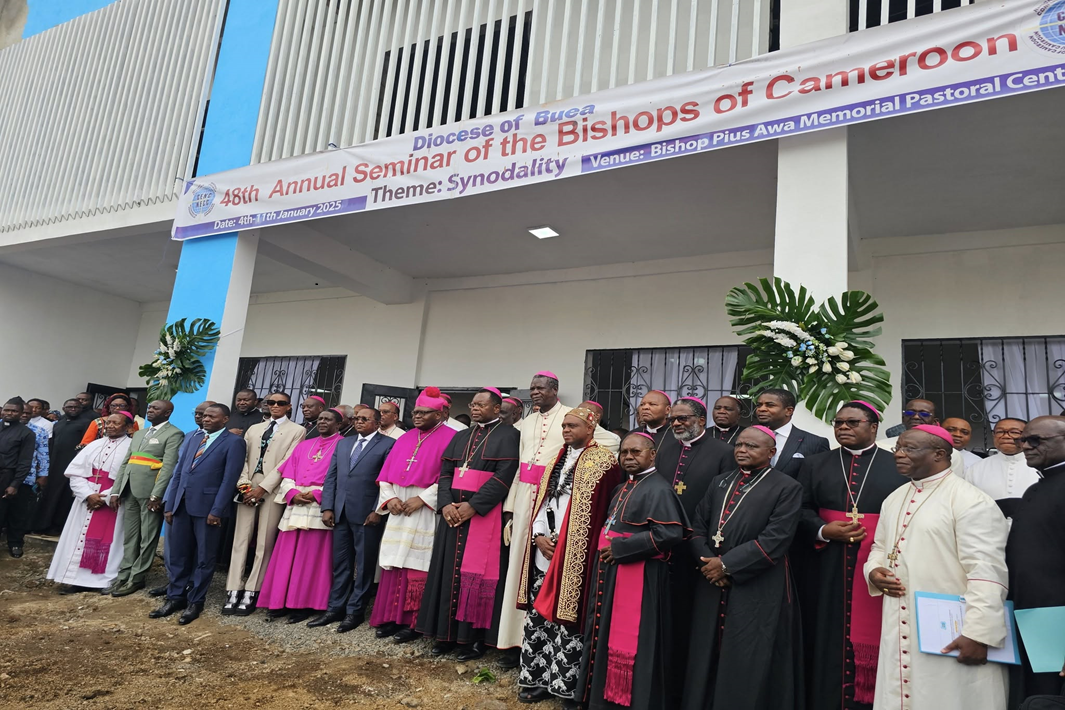By Paschal Norbert
BUEA, JANUARY 10, 2024 (CISA) – As Cameroon prepares for a pivotal presidential election in October 2025, Catholic bishops across the nation are amplifying their calls for President Paul Biya to step down, citing his advanced age, deteriorating health, and unfulfilled promises.
Biya, 92, has been in power for 42 years, making him the world’s oldest head of state. Though he has not officially declared his candidacy, his New Year’s address hinted at intentions to remain in office, a move that has sparked outcry among religious leaders and political observers.
Rt Rev Barthélemy Yaouda Hourgo, bishop of the Catholic Diocese of Yagoua, delivered a fiery critique on Equinoxe TV, imploring Cameroonians to reconsider their support for Biya.
“Enough is enough,” he declared. “The war in the North West Region is just one issue among many. Why do we encourage the Head of State to continue? Can you give your father a machete or a hoe to walk one kilometer to work in the fields? People are fed up.”
The bishop’s passionate plea underscored the mounting frustration among Cameroonians who have endured years of political stagnation and conflict, including a separatist crisis in the English-speaking regions and the ongoing threat of Boko Haram in the Far North.
Adding to the disquiet, Rt Rev Emmanuel Abbo, bishop of the Catholic Diocese of Ngaoundéré expressed dismay at the government’s stifling of dissent.
“The greatest suffering is to prohibit Cameroonians from expressing their ills,” he said, lamenting “Who will be left to govern when all Cameroonians have been crushed in this mill?”
Most Rev Samuel Kleda, archbishop of the Metropolitan Archdiocese of Douala was unequivocal in his opposition to another term for Biya, calling it “not realistic.” Speaking on Radio France Internationale (RFI), he reminded listeners of the finite nature of human life and leadership: “At some point, we leave this world. We are not immortal.”
Archbishop Jean Mbarga of Yaoundé took a reflective approach, urging the faithful to exercise their historical responsibility.
“We are entering a jubilee year and an election year,” he said, adding “I urge the faithful to assume their responsibilities towards the nation.”
The bishops’ collective stance comes as they convene in Buea for their 48th Annual Seminar from January 4 to 11. Observers expect the gathering to clarify their position on the upcoming elections and address the growing discontent within the nation.

In an apparent response to the bishops’ criticisms, Minister of Territorial Administration Atanga Nji Paul met with Archbishop José Avelino Bettencourt, the Apostolic Nuncio to Cameroon, on January 8. The papal envoy delivered a sealed message from Pope Francis to the minister and presented the Pope’s latest encyclical, Dilexit nos, which emphasizes love and reconciliation.
The meeting, described as a gesture of goodwill, also touched on the strong relationship between Cameroon and the Vatican, highlighted by past papal visits and the decade-long legal Framework Agreement between the two states. Both parties reiterated their commitment to promoting peace and dialogue.
Archbishop Bettencourt is expected to address the bishops on January 10 and preside over the closing Mass of the plenary meeting. His message, observers suggest, will aim to bridge tensions while reaffirming the Church’s role in advocating for justice and peace.
With the opposition fragmented and the Electoral Code widely criticized for favouring the ruling party, the bishops’ calls for change resonate with a population weary of unkept promises and prolonged suffering. As Cameroon enters a crucial election year, the Catholic Church’s moral authority may play a decisive role in shaping the nation’s future.
